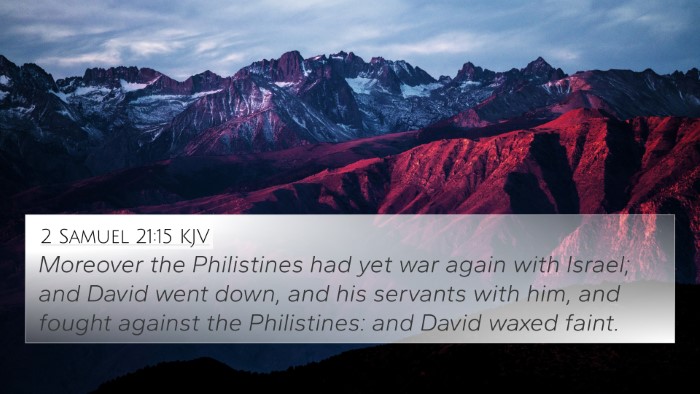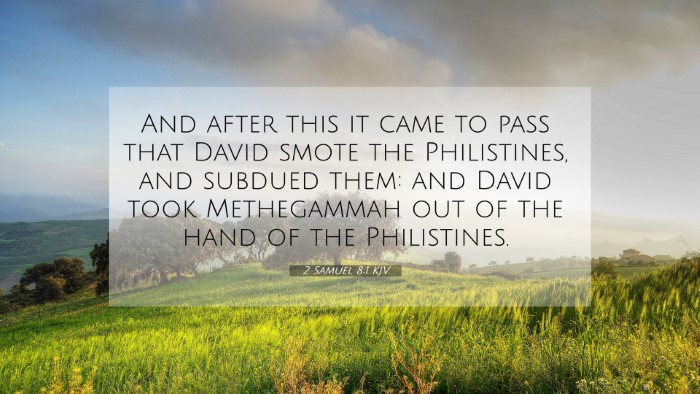Old Testament
Genesis Exodus Leviticus Numbers Deuteronomy Joshua Judges Ruth 1 Samuel 2 Samuel 1 Kings 2 Kings 1 Chronicles 2 Chronicles Ezra Nehemiah Esther Job Psalms Proverbs Ecclesiastes Song of Solomon Isaiah Jeremiah Lamentations Ezekiel Daniel Hosea Joel Amos Obadiah Jonah Micah Nahum Habakkuk Zephaniah Haggai Zechariah Malachi2 Samuel 8:1 Similar Verses
2 Samuel 8:1 Cross References
And after this it came to pass that David smote the Philistines, and subdued them: and David took Methegammah out of the hand of the Philistines.
Uncover the Rich Themes and Topics of This Bible Verse
Listed below are the Bible themes associated with 2 Samuel 8:1. We invite you to explore each theme to gain deeper insights into the Scriptures.
2 Samuel 8:1 Cross Reference Verses
This section features a detailed cross-reference designed to enrich your understanding of the Scriptures. Below, you will find carefully selected verses that echo the themes and teachings related to 2 Samuel 8:1 KJV. Click on any image to explore detailed analyses of related Bible verses and uncover deeper theological insights.

1 Chronicles 18:1 (KJV) »
Now after this it came to pass, that David smote the Philistines, and subdued them, and took Gath and her towns out of the hand of the Philistines.

2 Samuel 7:9 (KJV) »
And I was with thee whithersoever thou wentest, and have cut off all thine enemies out of thy sight, and have made thee a great name, like unto the name of the great men that are in the earth.

2 Samuel 2:24 (KJV) »
Joab also and Abishai pursued after Abner: and the sun went down when they were come to the hill of Ammah, that lieth before Giah by the way of the wilderness of Gibeon.

2 Samuel 21:15 (KJV) »
Moreover the Philistines had yet war again with Israel; and David went down, and his servants with him, and fought against the Philistines: and David waxed faint.
2 Samuel 8:1 Verse Analysis and Similar Verses
Understanding 2 Samuel 8:1
Verse: 2 Samuel 8:1 - "And after this it came to pass, that David smote the Philistines, and subdued them: and David took Metheg-ammah out of the hand of the Philistines."
Overview
The verse from 2 Samuel 8:1 marks a significant moment in King David's military career, depicting his victory over the Philistines and his consolidation of power. This passage not only reflects David's leadership and military prowess but also serves as a pivotal point in the historical narrative of Israel.
Commentary Insights
This verse has been examined by various commentators who provide a rich tapestry of interpretation:
- Matthew Henry: Henry notes that David's victories were not only a result of his military strength but also God's favor. The defeat of the Philistines symbolizes the triumph of God's people over their enemies, establishing David as a king who relies on divine guidance.
- Albert Barnes: Barnes elaborates on the significance of taking Metheg-ammah, indicating it was a strategic stronghold. He interprets this victory as a step towards unifying Israel under a strong and capable leader.
- Adam Clarke: Clarke highlights the importance of this military success in the context of David's reign. He points out that it serves as an affirmation of David's previous promises and the establishment of peace in the land.
Thematic Connections
The themes of victory and divine assistance are prevalent in this verse, leading to numerous connections between various scriptures:
- Covenant Promises: This victory can be linked to God's covenant with David, found in 2 Samuel 7:11-16, where God assures David of his enduring dynasty.
- Philistine Oppression: The historical conflict with the Philistines is echoed throughout the texts, including 1 Samuel 17, where David first encounters Goliath.
- Divine Support in Battles: Other biblical accounts, like Exodus 14:14 and Joshua 10:14, reinforce the theme that the Lord fights on behalf of His people.
- Establishment of the Kingdom: This passage aligns with 1 Chronicles 11:1-3, where David is recognized as king by all Israel, suggesting the importance of recognition for his military successes.
- Victory Analysis: Psalm 60:12 articulates trusting in God for victory, resonating with the trust David places in the Lord during his campaigns.
- Leadership Qualities: 1 Timothy 3:1-7 discusses the qualities of a leader. David exemplifies these traits through his courage and reliance on God.
- Preparation for Future Conflicts: In Jeremiah 51:20, God refers to His people as weapons against the nations, reflecting the ongoing struggles similar to those faced by David.
Cross-Referencing and Historical Context
When exploring 2 Samuel 8:1, it becomes crucial to employ cross-referencing tools to understand the broader context:
- Bible Concordance: A concordance will illustrate the connections and occurrences of related terms such as 'Philistines' and 'victory'.
- Bible Cross-Reference Guide: Utilizing this guide allows one to examine similar narratives and thematic links throughout both Testaments.
- Bible Chain References: These resources can aid in identifying related passages and themes surrounding victory in Scripture.
- Comparative Bible Verse Analysis: Analyzing verses like 1 Samuel 31:1-3 provides insight into the ongoing conflict between Israel and the Philistines.
Conclusion
In summary, 2 Samuel 8:1 represents not just a historical military victory but the fulfillment of God's promises to David. The verse underlines the importance of divine support and strategic leadership in establishing a strong kingdom. By engaging in comparative analysis of related scripture, one can appreciate the interconnectedness of these events and their significance within biblical history.
Through effective tools for cross-referencing and understanding thematic connections, believers can deepen their study of the Bible and gain insights into their faith. This verse encourages reflection on God's providence in our own struggles and victories.


